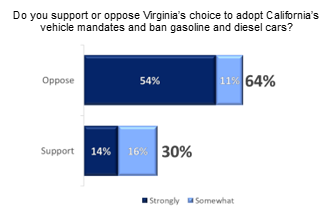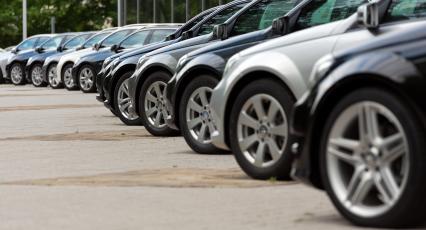You may have seen that AFPM is shining a spotlight on the Commonwealth of Virginia and its unlikely tie to California’s looming ban on gasoline and diesel vehicles. Allow us to explain why, and also to lay out the current state of vehicle mandates and bans in Virginia.
The big picture.
Most Virginians have no idea that in 2021 the Commonwealth adopted California’s electric vehicle mandate, a policy that will effectively ban the sale of new internal combustion engine vehicles (more on that connection below). Consumers and families in Virginia—not California regulators—should be the ones deciding what vehicles best meet their needs and budgets. Governor Youngkin pushed for legislation to rescind California’s mandate and return choice to Virginia consumers, but the State Senate inexplicably rejected those proposals earlier this year.
 When Virginians learn that the Commonwealth has adopted California’s electric vehicle mandate, they do not like it, and they are a lot less likely to support officials who embrace these restrictive, costly policies.
When Virginians learn that the Commonwealth has adopted California’s electric vehicle mandate, they do not like it, and they are a lot less likely to support officials who embrace these restrictive, costly policies.
Both California and the federal government are clear in their intent to get rid of vehicles that run on gasoline, diesel and renewable fuels. The policies they’re enacting to accomplish this are terrible for U.S. consumers, our economy and national security, and for the millions of families whose livelihoods are supported by American fuel, biofuel and petrochemical manufacturing. In the face of these policy challenges, AFPM will continue to stand up for consumer choice, our industry, our American-made and American-grown fuel products, and the men and women who make them.
How is Virginia tied to California’s electric vehicle mandate and its newer ban on gas- and diesel-fueled cars and trucks?
This question is key.
In 2021, Governor Ralph Northam and the Virginia General Assembly approved legislation—the Clean Cars Virginia Bill (H.B. 1965)—that requires the Commonwealth to adopt the State of California’s vehicle emissions regulations and electric vehicle mandates. Virginia can’t customize these policies; it has to implement California’s exact regulations, as written by officials in Sacramento.
At the time this bill was passed, California had enacted an electric vehicle sales mandate, so Virginia was immediately committed to adopting the same policy which will take effect early next year. However, since the bill’s passage, California took this a step further and has now finalized regulations to outlaw sales of gasoline, diesel, flex fuel and most hybrid vehicles. Virginia is committed by the 2021 law to also adopt these more stringent regulations. They will begin phasing in around 2026, concluding with a full ban on sales of new gas and diesel cars and trucks by 2035.
The Virginia Attorney General’s office confirmed to the Associated Press last year that “the 2021 law bound Virginia to California’s regulations...” The same story noted that environmental attorneys concur with the opinion, agreeing that “under current law, Virginia would have to get in line with California.”
According to the Virginia Department of Environmental Quality, “The Clean Car Standards… will eventually require the sale of only new ZEVs in the future.” That means only new electric, hydrogen or other non-tailpipe-emitting vehicles would be available for purchase in the Commonwealth.
So why is AFPM shining a light on Virginia?
We were just as surprised as many Virginians earlier this year when an effort—led by Governor Youngkin—to decouple Virginia from California’s electric vehicle mandates and its even more extreme ban on new gas cars and trucks failed by a single vote in a Senate Committee.
California vehicle mandates and bans are bad policy and bad for Virginians.
Many Virginians, though, have no idea that they are obligated to follow California’s regulations. When they find out about this, they oppose the Commonwealth’s alignment with California, and they say they are more likely to support officials who would separate Virginia from California’s mandates and bans.
We want Virginians to be aware of this tie to California policy so they can contact their current and prospective elected officials and urge them to be on the right side of this issue.
Where do Virginia elected officials stand?
During an October 30 telephone town hall event, AFPM President and CEO Chet Thompson was joined by Steve Bradbury, Distinguished Fellow at the Heritage Foundation, and Virginia Delegate Tony Wilt (R), author of legislation to repeal Virginia’s 2021 law. Chet, Steve Bradbury and Delegate Wilt discussed the state of vehicle policy with households across Virginia and the rapidly nearing 2024 “effective date” for California’s electric vehicle sales mandate in the Commonwealth.
Virginia callers expressed concern about being made to follow California’s standards and several asked to know their elected officials’ positions on the policy. Two votes in recent years showcase where many current and prospective officials stand: the 2021 vote to adopt California’s standards, and the 2023 vote to have those standards repealed. Below, you’ll find records for the House of Delegates and Senate votes on both policies.
-
2021 vote requiring Virginia to adopt California vehicle emissions standards
-
House of Delegates, vote taken February 23, 2021. Measure passed 53 Yea to 44 Nay.*
-
Virginia Senate, vote taken February 19, 2021. Measure passed 21 Yea to 15 Nay.*
*These Yea votes support the adoption of California’s vehicle standards.
-
-
2023 vote attempt to repeal the 2021 bill and stop California’s standards in Virginia
-
House of Delegates, vote taken January 25, 2023. Measure passed 52 Yea to 48 Nay.**
-
Virginia Senate, Agriculture, Conservation and Natural Resources Committee vote taken February 14, 2023. Measure “passed by indefinitely” by a vote of 8 Yea to 7 Nay.***
**Yea votes cast in the House of Delegates earlier this year would have repealed the 2021 law. These officials oppose California’s standards.
***Yea votes in Senate Committee are opposite from the House of Delegates. By voting to “pass by indefinitely” members of this Senate Committee killed the repeal legislation by a single vote.
-
To find your current elected officials so you can match their names with their records in the votes above, visit the Virginia General Assembly website. You may also contact your elected officials directly and ask them where they stand.
Where can I read more?
-
Associated Press: Leaders want to untie Virginia from California EV rule
-
“Virginia is currently on a path toward adopting California’s new rules for transitioning to zero-emission vehicles because of 2021 legislation that involved adopting the West Coast state’s emissions standards…”
-
Associated Press: Virginia Senate Democrats kill effort to repeal electric car rule
-
“California… set itself on a path to require all new cars, pickup trucks and SUVs be electric or hydrogen powered by 2035… [Commonwealth] officials confirmed the change would apply to Virginia.”
-
Virginia Public Media: All new vehicles sold in Virginia must be electric by 2035
-
“…there will be many more [electric vehicles] registered in the next 12 years, due to the state mandate that all new vehicles sold must be electric by 2035. The first checkpoint along that timeline is 35% of all new cars and trucks sold in Virginia with a 2026 model year must be electric.
-
Richmond Times-Dispatch: Legislators seek to repeal law hitching VA to California emissions standards
-
"California's recent push to ban the sale of gasoline-powered vehicles in the state by 2035… would affect California and each state that has adopted its standards."
-
Virginia Mercury: Virginia House votes to repeal Clean Cars law
-
“…the House of Delegates passed legislation Wednesday to repeal a law tying Virginia to California vehicle emissions standards that are set to ban the sale of new gas-powered cars in 2035.”
-
“In 2021, the General Assembly passed legislation that coupled Virginia vehicle emissions regulations with those set by the California Air Resources Board, a set of rules often called the “Clean Car” standards. Last year, CARB issued a new rule that will require that all new cars sold in the state be zero emission beginning in 2035.”
The American Fuel & Petrochemical Manufacturers (AFPM) is the leading trade association representing the makers of the fuels that keep us moving, the petrochemicals that are the essential building blocks for modern life, and the midstream companies that get our feedstocks and products where they need to go. We make the products that make life better, safer and more sustainable — we make progress.


